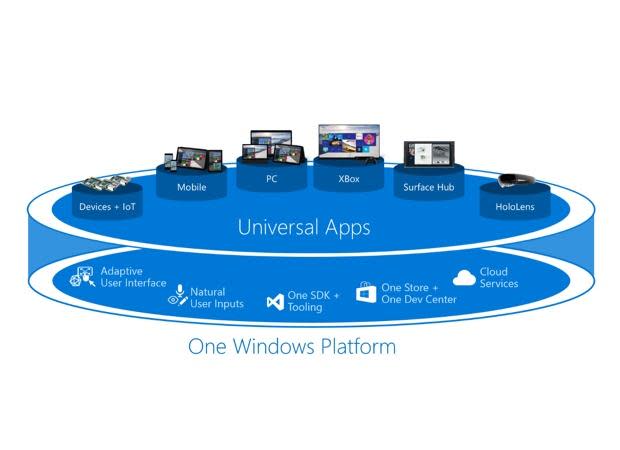Microsoft universal app platform could be a game changer

No matter how great an operating system is, or even how awesome the devices it runs on are, no platform can survive without a robust catalog of apps. One of the crucial elements in Microsoft's strategy to maintain the dominance of Windows on PCs and claim its fair share of the mobile market is the universal app platform.
This week at Mobile World Congress 2015 in Barcelona Microsoft expanded on its universal app platform vision. Kevin Gallo outlined three distinct benefits of the universal app platform: cross-platform device scale, delivering a unique experience, and maximizing return on investment for app developer effort.
In a blog post related to the Mobile World Congress presentation Gallo explained that Microsoft has seen an evolution in how customers use mobile devices. What began as a distinctly separate environment driven by native apps and mobile websites has converged to be a more seamless experience across platforms.
Gallo said, "Windows 10 is about making it easier for you and your code to do more and go further with a new platform built to maximize and extend your existing investments, both in your code and your skills."
Microsoft's goal with the universal app platform is to merge those separate worlds together. A universal app will work on a desktop PC, and a smartphone or tablet -- providing a consistent experience no matter what device the customer is using.
At the same time, the universal app is flexible enough to deliver custom interaction based on the screen size and the tools available on a given device. Adaptive UX tailors the screen layout and user controls based on the size and capabilities of the device the app is running on. The app itself will be the same, but the way a customer interacts with it will vary from a desktop with a mouse and keyboard to a tablet with a touchscreen display.
The Holy Grail of the universal app platform is the ability to maximize the return on investment for developers. Developers today have to create an application for Windows PCs, and another for Windows Phone, and maybe even another for Windows tablets or Windows PCs with smaller displays. That's a lot of wasted time and effort just to retool an app that was already developed to be able to work on various form factors.
Developing for Microsoft's universal app platform also maximizes the potential audience for an app. The entire world of Windows PCs and tablets and Windows Phone devices is a huge market opportunity that provides developers with the best odds of success.
It's still a bit early to tell just how the whole universal app platform will pan out. If the execution and experience can come close to living up to the vision Microsoft has painted, the universal app platform will be a game changer that could shift things heavily back in Microsoft's favor.
Also see
Microsoft's new Windows 10 Universal App Platform: A 'superset of WinRT (ZDNet)
With the Windows 365 trademark, the Windows 10 subscription plan becomes apparent
Microsoft Office strategy takes the wind out of competitors' sails
Get better search results with Windows 10's Universal Search feature
Android is the next platform of choice for Windows developers
Disclaimer: TechRepublic, ZDNet, and CNET are CBS Interactive properties.

